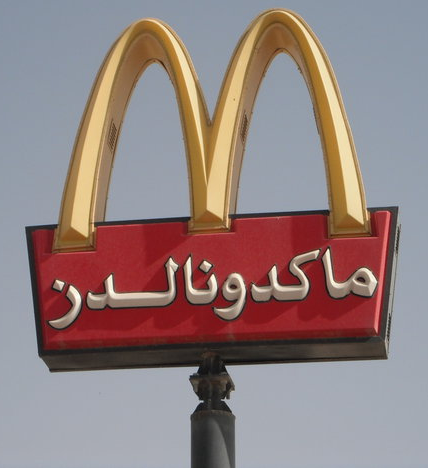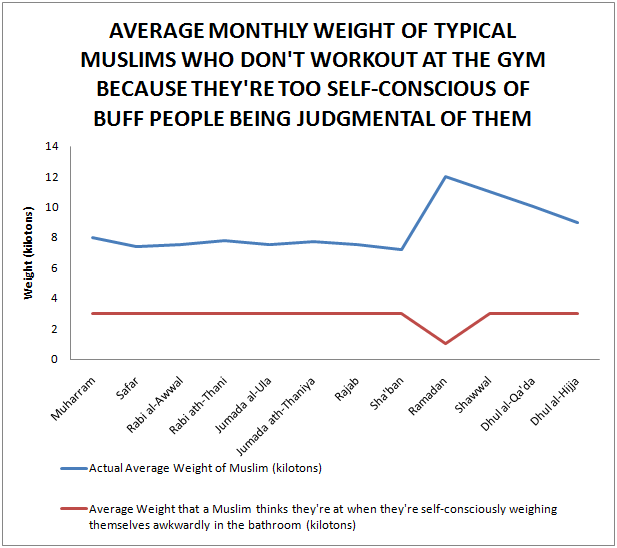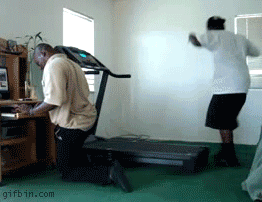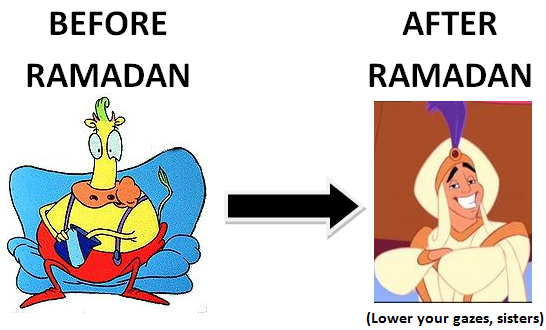- Messages
- 1,767
- Reaction score
- 22,887
- Points
- 523
Ramadan is a time in which we rejuvenate ourselves spiritually. The fast is a form of ibada that we do solely for the sake of Allah, seeking only his rewards and his pleasure. We must keep our intentions pure for this sake and this sake alone. We read articles on the physical benefits of fasting and we talk long winded about our "need" to fast for physical restoration. But the fast of Ramadan is not intended for this purpose. It is essential that we maintain its intent and purpose for indeed the Messenger of Allah (saw) said "he who fast with the intentions of pleasing Allah his reward is with his lord".
However on the practical side of fasting, every year we deviate from the sunnah and we suffer physically. It's often manifestation is weight gain, which then leads to tiredness which prevents us from staying awake for our late night ibada and thus the physical harm effects us spiritually and it comes full circle. Our intentions are not to make the fast a month of dieting but minimally make it a month in which we do not worsen our physical condition. The following are some practical tips on how to avoid the "notorious" Ramadan weight gain that many Muslim suffer from.
1. Eat protein in the morning
Breakfast is still the most important meal of the day. So much so that it is a Sunna. When eating suhur resist the erg to try to make up for the food you will be missing during the day. We are not whales, thus we do not have an extra stomach to hold food for later. Don't eat a stack of pancakes thinking if you eat 5 instead of your normal 3 you will be satisfied longer. Calories from carbohydrates (i.e. pancakes, grits, waffles, toast etc) are burned much faster than protein. Even though hunger during some part of the day is inevitable with fasting 13 hours days, you can delay when the hunger kicks in by having a healthy portion of protein with your suhoor. Having eggs with your pancakes or waffles or a protein shake with your oatmeal will have a better effect on your system than a pure carbohydrate meal.
2. Drink plenty of water when you break your fast
It is very easy to become dehydrated and not drink enough water during Ramadan. We spend most of our alert hours not drinking anything. When the Messenger of Allah (saw) could not find dates to break fast with he would break fast with water. Water is an essential part of a healthy diet even when you are fasting. Dehydration is often misinterpreted as hunger. When we are dehydrated when we break fast, then we have the hunger of the fast on top of the mistaken hunger of being dehydrated. Break your fast then drink 2 large glasses of water before you eat your iftar meal. Eat slowly, consciously and with intent to eat for nourishment not to satisfy your hunger and cravings.
3. Eat consciously
One of the joys of a fasting person is mentioned in the hadith when Allah says in hadith kudsi that a fasting person will have two joys, one when he breaks his fast and one when he meets his lord. There is very little that compares to having fasted all day then sitting in front of a nice spread with every dish you had been fantasizing about, everything from your favorite roasted lamb to cake and cookies. However there is very little that can compare to the amount of self control we must have when faced with such a feast of the eyes and the palette. We must remember that we are hungry because we are Muslims and as Muslims we much keep the Sunnah in mind and in actions. Remember the advice of the Prophet (saw) was a one-third rule. One-third food, one-third drink and one-third air. When we sit and eat to our full at iftar we violate the sunnah and we violate our bodies. The Messenger of Allah (saw) said: "A Muslim should never loosen his waist wrapper due to over eating". Ramadan is a time in which we are trained in self control. This self control and discipline is not limited to the day. This training during the day extends to all parts of our lives and our behavior. And there is no better time to show the benefit of this training then sitting down to an iftar spread and NOT eating everything in sight,.
However on the practical side of fasting, every year we deviate from the sunnah and we suffer physically. It's often manifestation is weight gain, which then leads to tiredness which prevents us from staying awake for our late night ibada and thus the physical harm effects us spiritually and it comes full circle. Our intentions are not to make the fast a month of dieting but minimally make it a month in which we do not worsen our physical condition. The following are some practical tips on how to avoid the "notorious" Ramadan weight gain that many Muslim suffer from.
1. Eat protein in the morning
Breakfast is still the most important meal of the day. So much so that it is a Sunna. When eating suhur resist the erg to try to make up for the food you will be missing during the day. We are not whales, thus we do not have an extra stomach to hold food for later. Don't eat a stack of pancakes thinking if you eat 5 instead of your normal 3 you will be satisfied longer. Calories from carbohydrates (i.e. pancakes, grits, waffles, toast etc) are burned much faster than protein. Even though hunger during some part of the day is inevitable with fasting 13 hours days, you can delay when the hunger kicks in by having a healthy portion of protein with your suhoor. Having eggs with your pancakes or waffles or a protein shake with your oatmeal will have a better effect on your system than a pure carbohydrate meal.
2. Drink plenty of water when you break your fast
It is very easy to become dehydrated and not drink enough water during Ramadan. We spend most of our alert hours not drinking anything. When the Messenger of Allah (saw) could not find dates to break fast with he would break fast with water. Water is an essential part of a healthy diet even when you are fasting. Dehydration is often misinterpreted as hunger. When we are dehydrated when we break fast, then we have the hunger of the fast on top of the mistaken hunger of being dehydrated. Break your fast then drink 2 large glasses of water before you eat your iftar meal. Eat slowly, consciously and with intent to eat for nourishment not to satisfy your hunger and cravings.
3. Eat consciously
One of the joys of a fasting person is mentioned in the hadith when Allah says in hadith kudsi that a fasting person will have two joys, one when he breaks his fast and one when he meets his lord. There is very little that compares to having fasted all day then sitting in front of a nice spread with every dish you had been fantasizing about, everything from your favorite roasted lamb to cake and cookies. However there is very little that can compare to the amount of self control we must have when faced with such a feast of the eyes and the palette. We must remember that we are hungry because we are Muslims and as Muslims we much keep the Sunnah in mind and in actions. Remember the advice of the Prophet (saw) was a one-third rule. One-third food, one-third drink and one-third air. When we sit and eat to our full at iftar we violate the sunnah and we violate our bodies. The Messenger of Allah (saw) said: "A Muslim should never loosen his waist wrapper due to over eating". Ramadan is a time in which we are trained in self control. This self control and discipline is not limited to the day. This training during the day extends to all parts of our lives and our behavior. And there is no better time to show the benefit of this training then sitting down to an iftar spread and NOT eating everything in sight,.









